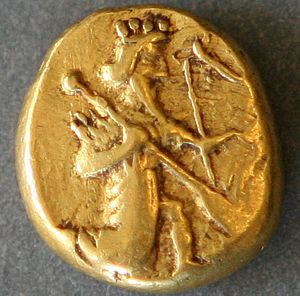Iranian rial facts for kids
Quick facts for kids Iranian rial |
|||
|---|---|---|---|
|
|||
| ISO 4217 Code | IRR | ||
| Official user(s) | Iran | ||
| Unofficial user(s) |
|
||
| Inflation | 30.9% (April 2024) | ||
| Superunit | |||
| 10 | toman تومان plural تَوامين (tavāmīn) or تومانات (tūmānāt) |
||
| Subunit | |||
| 1⁄100 | dinar (obsolete) |
||
| Symbol | ﷼ | ||
| Coins | |||
| Freq. used | Rls 5,000 | ||
| Rarely used | Rls 1,000, Rls 2,000 | ||
| Banknotes | |||
| Freq. used | Rls 10,000, Rls 20,000, Rls 50,000, Rls 100,000, Rls 500,000, Rls 1,000,000, Rls 2,000,000 | ||
| Rarely used | Rls 1,000, Rls 2,000, Rls 5,000 | ||
| Printer | SPMO (Since 1982) De La Rue (former) American Banknote Corporation (former) |
||
The rial (Persian: ریال ایران, romanized: riyâl-è Irân) is the official money used in Iran. Its symbol is ﷼. The rial is divided into 100 smaller units called dinars. However, because the rial is not worth much today, dinars are almost never used.
Even though you can use card machines (POS terminals) in Iran, the country is not part of big international card networks. This is because of rules and agreements between Iran and other countries. So, if you visit Iran, it's a good idea to put money on a local prepaid card.
There isn't an official symbol for the rial that everyone uses. But the Iranian standards group, ISIRI, created a symbol for it to be used on typewriters.
Iran's government has decided to change its money system. They plan to remove four zeros from the rial. The new money will be called the toman, which was an old Iranian currency. One toman will be worth 10,000 rials.
Contents
- History of the Rial Currency
- Understanding the Rial's Value
- Coins of Iran
- Banknotes of Iran
- Banknotes from the Qajar Era (1850–1925)
- Banknotes from Reza Shah's Time (1925–1941)
- Banknotes from Mohammad Reza Shah's Time (1942–1978)
- Banknotes with Imam Reza Shrine (1980–1982)
- Banknotes from the Revolution Series (1981–2005)
- Banknotes with Ruhollah Khomeini (1992–2019)
- Newer Banknotes (2019–2023)
- How Rial Banknotes Are Printed
- Images for kids
- See also
History of the Rial Currency
The rial was first used in Iran in 1798. It was a coin worth 1,250 dinars. This was also one-eighth of a toman.
In 1825, the rial was no longer made. Instead, the qiran was used. The qiran was part of a decimal system, meaning it was based on units of 10. It was worth one-tenth of a toman.
The rial came back in 1932. It replaced the qiran at the same value. The new rial was divided into 100 new dinars.
Before 1932, Iran used different coins and currencies. Some of their names are still used in Iranian sayings today:
| Old currency | Value | First Used |
|---|---|---|
| Dinar | - | Umayyad Caliphate |
| Shahi | 10 Dinars | Iranian Intermezzo |
| Abbasi | 100 Dinars | Safavid Iran |
| Naderi | 1,000 Dinars | Afsharid Iran |
| Rial | 10,000 Dinars | Zand dynasty |
| Qiran | 100,000 Dinars | Early Qajar Iran |
| Toman | 1,000,000 Dinars | Late Qajar Iran |
Understanding the Rial's Value
The value of the Iranian rial has changed a lot over time. It is often compared to other major currencies like the U.S. dollar.
In 1932, the rial's value was linked to the British pound. Later, in 1945, it was linked to the U.S. dollar. For example, in 1957, US$1 was worth Rls 75.75.
After the Iranian Revolution in 1979, the rial's value dropped quickly. Many people moved their money out of the country. This caused the rial to become much weaker. For example, in 1978, US$1 was about Rls 71. But by 1999, US$1 was worth Rls 9,430.
The Central Bank of Iran tries to control the rial's value. They manage how much foreign money is available. This helps them influence the rial's strength.
Sometimes, there is a "black market" where people exchange foreign money. This market offers different rates than the official ones. In 2010, international rules made it harder to transfer money to and from Iran. This caused the difference between official and black market rates to grow.
In January 2012, the rial lost half its value in just a few days. This happened after new international rules were put in place against Iran's central bank. This made Iranian products cheaper for other countries to buy.
By June 2020, the rial's value had dropped a lot again. This led to high inflation, meaning prices for goods and services increased quickly. Experts believe this happened because the government printed too much money.
The rial's value also dropped by 29% after protests began in September 2022. This followed the death of Mahsa Amini.
Changing the Money System
Because the rial has such a low value, there have been many talks about changing the currency. This is called "redenomination." It means removing zeros from the banknotes.
In 2008, the Central Bank of Iran said it planned to remove four zeros. They also wanted to rename the currency the toman. As a first step, they printed large "traveller's cheques" that looked like banknotes. These had "50" and "100" printed on them, meaning 50,000 and 100,000 tomans.
In 2019, the Iranian government officially approved a plan to change the currency. One toman will now be equal to Rls 10,000. This change will happen gradually over about two years.
Coins of Iran
Old Rial Coins
In the late 1700s and early 1800s, silver coins were made. They came in values like 1/8, 1/4, 1/2, and 1 rial.
Modern Rial Coins
When the rial was brought back in 1932, new coins were made. These included values like 1, 2, 5, 10, and 25 dinars. There were also coins for Rls 1/2, Rls 1, Rls 2, and Rls 5. The silver coins were Rls 1/2 to Rls 5. Gold coins called pahlavi were also made, starting at Rls 100.
Over the years, the sizes of the coins changed. In 1953, silver coins were no longer made. The smallest coin became 50 dinars. In 1972, Rls 20 coins were introduced.
After the Islamic Revolution in 1979, the pictures on the coins changed. The image of the Shah (king) was removed. New coins were made in 1992, including smaller Rls 1, Rls 5, Rls 10, and Rls 50 coins. New Rls 100 coins were also added.
In 2004, the Rls 50, Rls 100, and Rls 250 coins became smaller. New Rls 500 coins were also introduced. Even newer and smaller Rls 250 and Rls 500 coins came out in 2009. That year, a new Rls 1,000 coin was also made. In 2010, Rls 2,000 and Rls 5,000 rial coins were added.
Digital Rial
The Digital Rial is a new type of money. It is based on the Modern Rial. The Central Bank of Iran plans to release it.
Current Coins in Use
Here are some of the Iranian rial coins you might see today:
| Iranian rial coins currently in circulation | ||||||||||||
|---|---|---|---|---|---|---|---|---|---|---|---|---|
| Image | Value | Technical details | What's on them | When first made | ||||||||
| Front | Back | Diameter | Thickness | Weight | Material | Edge | Front side | Back side | Year | |||
| Rls 50 | 20.2 mm | 1.33 mm | 3.5 g | copper nickel aluminium |
Reeded | Value, design, year, "Islamic Republic of Iran" | Fatima Masumeh Shrine | 2004 | ||||
| Rls 100 | 22.95 mm | 1.36 mm | 4.6 g | copper nickel aluminium |
Reeded | Value, design, year, "Islamic Republic of Iran" | Imam Reza Shrine | 2004 | ||||
| Rls 250 | 18.8 mm | 1.56 mm | 2.8 g | copper nickel aluminium |
Reeded | Value, design, year, "Islamic Republic of Iran" | Feyziyeh School | 2009 | ||||
| Rls 500 | 20.8 mm | 1.66 mm | 3.9 g | copper nickel aluminium |
Reeded | Value, design, year, "Islamic Republic of Iran" | Saadi's Mausoleum in Shiraz | 2009 | ||||
| Rls 1,000 | 23.7 mm | 1.9 mm | 5.8 g | copper nickel aluminium |
Reeded | Value, design, year, "Islamic Republic of Iran" | Khaju Bridge | 2009 | ||||
| Rls 2,000 | 26.3 mm | 1.76 mm | 6.8 g | copper nickel zinc |
Reeded | Value, design, year, "Islamic Republic of Iran" | Shrine of Imam Reza | 2010 | ||||
| Rls 5,000 | 29.3 mm | 2 mm | 10.1 g | copper nickel zinc |
Reeded | Value, design, year, "Islamic Republic of Iran" | Text about the Central Bank's 50th Anniversary | 2010 | ||||
| These images are to scale at 2.5 pixels per millimetre. For table standards, see the coin specification table. | ||||||||||||
Banknotes of Iran
In 1932, the "Bank Melli Iran" started printing banknotes. They came in values of Rls 5, Rls 10, Rls 20, Rls 50, Rls 100, and Rls 500. Later, Rls 1,000 notes were added in 1935, and even higher values like Rls 5,000 and Rls 10,000 in 1952.
In 1961, the Central Bank of Iran took over printing paper money. After the Islamic Revolution in 1979, the banknotes were changed. Pictures of the Shah were covered up. New banknotes were then printed with values like Rls 100, Rls 200, Rls 500, Rls 1,000, Rls 5,000, and Rls 10,000. Rls 2,000 notes were added in 1986.
Today, the Central Bank of Iran issues these notes. Each note has the signature of the bank's president. Lower value notes like Rls 100, Rls 200, and Rls 500 are not very common anymore. People often carry many Rls 100,000 notes for daily use.
Banknotes from the Qajar Era (1850–1925)
These banknotes were used during the Qajar dynasty in Iran.
| Old Banknotes | |||||||
|---|---|---|---|---|---|---|---|
| Image | Value | Size (mm) |
Main color | What's on it | |||
| Front | Back | Front | Back | ||||
 |
 |
1 toman | 130 × 67 | Silver | Nasser al-Din Shah Qajar | Value, "Imperial State of Iran" | |
 |
 |
5 tomans | 136 × 69 | Tan | Nasser al-Din Shah Qajar | Value, "Imperial State of Iran" | |
 |
 |
50 tomans | 142 × 71 | Gray | Nasser al-Din Shah Qajar | Value, Lion and Sun | |
Banknotes from Reza Shah's Time (1925–1941)
These notes feature Reza Shah Pahlavi, who was the Shah of Iran.
| Old Banknotes | |||||||
|---|---|---|---|---|---|---|---|
| Image | Value | Size (mm) |
Main color | What's on it | |||
| Front | Back | Front | Back | ||||
 |
 |
Rls 5 | 130 × 67 | Green | Reza Shah Pahlavi | Value, Lion and Sun with crown | |
 |
 |
Rls 10 | 136 × 69 | Brown | Reza Shah Pahlavi | Value, Lion and Sun with crown | |
 |
 |
Rls 20 | 142 × 71 | Purple | Reza Shah Pahlavi | Value, Lion and Sun with crown | |
 |
 |
Rls 500 | 142 × 71 | Navy | Reza Shah Pahlavi | Tomb of Cyrus | |
 |
 |
Rls 1,000 | 148 × 73 | Silver | Reza Shah Pahlavi | Mount Damavand | |
Banknotes from Mohammad Reza Shah's Time (1942–1978)
These banknotes show Mohammad Reza Shah Pahlavi, the last Shah of Iran.
| Old Banknotes | |||||||
|---|---|---|---|---|---|---|---|
| Image | Value | Size (mm) |
Main color | What's on it | |||
| Front | Back | Front | Back | ||||
 |
 |
Rls 10 | 130 × 67 | Silver | Mohammad Reza Shah Pahlavi | Imperial seal of Darius the Great | |
 |
 |
Rls 10 | 130 × 67 | Silver | Mohammad Reza Shah Pahlavi | Avicenna Mausoleum | |
 |
 |
Rls 10 | 130 × 67 | Silver | Mohammad Reza Shah Pahlavi | Amir Kabir Dam | |
 |
 |
Rls 20 | 130 × 67 | Orange | Mohammad Reza Shah Pahlavi | Amir Kabir Dam | |
 |
 |
Rls 50 | 130 × 67 | Green | Mohammad Reza Shah Pahlavi | Mohammad Reza Shah Pahlavi in a public meeting | |
 |
 |
Rls 50 | 130 × 67 | Green | Mohammad Reza Shah Pahlavi | Pasargadae | |
 |
 |
Rls 100 | 136 × 69 | Purple | Mohammad Reza Shah Pahlavi | Social services | |
 |
 |
Rls 100 | 136 × 69 | Purple | Mohammad Reza Shah Pahlavi | Marble Palace | |
 |
 |
Rls 100 | 136 × 69 | Purple | Reza Shah Pahlavi and Mohammad Reza Shah Pahlavi | 50th Anniversary of the establishment of the Pahlavi dynasty | |
 |
 |
Rls 200 | 136 × 69 | Blue-green | Mohammad Reza Shah Pahlavi | Shahyad Tower | |
 |
 |
Rls 500 | 142 × 71 | Silver-yellow | Mohammad Reza Shah Pahlavi | Marlik Cup | |
 |
 |
Rls 1,000 | 148 × 73 | Brown | Mohammad Reza Shah Pahlavi | Tomb of Hafez | |
 |
 |
Rls 5,000 | 154 × 75 | Blue | Mohammad Reza Shah Pahlavi | Golestan Palace | |
 |
 |
Rls 10,000 | 160 × 77 | Green | Mohammad Reza Shah Pahlavi | Baharestan | |
Banknotes with Imam Reza Shrine (1980–1982)
These banknotes feature the Imam Reza shrine, an important religious site in Iran.
| Old Banknotes | |||||||
|---|---|---|---|---|---|---|---|
| Image | Value | Size (mm) |
Main color | What's on it | |||
| Front | Back | Front | Back | ||||
 |
 |
Rls 100 | 142×71 | Purple | Imam Reza shrine | Chaharbagh School | |
 |
 |
Rls 200 | 148×73 | Blue-green | Imam Reza shrine | Avicenna Mausoleum | |
 |
 |
Rls 500 | 154×75 | Brown | Imam Reza shrine | Winged horse | |
 |
 |
Rls 1,000 | 160×77 | Pink | Imam Reza shrine | Tomb of Hafez | |
 |
 |
Rls 5,000 | 166×79 | Purple | Imam Reza shrine | Tehran's Oil refinery | |
 |
 |
Rls 10,000 | 172×81 | Green | Imam Reza shrine | Baharestan | |
Banknotes from the Revolution Series (1981–2005)
These banknotes were issued after the Islamic Revolution.
| Old Banknotes | |||||||
|---|---|---|---|---|---|---|---|
| Image | Value | Size (mm) |
Main color | What's on it | |||
| Front | Back | Front | Back | ||||
 |
 |
Rls 100 | 130×67 | Purple | Hassan Modarres | Old building of Islamic Consultative Assembly | |
 |
 |
Rls 200 | 136×69 | Grey | Jame Mosque of Yazd | Agricultural Workers | |
 |
 |
Rls 500 | 142×71 | Gray-green | Friday prayers | University of Tehran main entrance | |
 |
 |
Rls 1,000 | 148×73 | Brown | Feyziyeh School | Dome of the Rock | |
 |
 |
Rls 2,000 | 151×74 | Purple | Liberation of Khorramshahr | Kaaba | |
 |
 |
Rls 5,000 | 154×75 | Red | Revolutionaries | Fatima Masumeh Shrine | |
 |
 |
Rls 10,000 | 160×77 | Blue | Revolutionaries | Imam Reza shrine | |
Banknotes with Ruhollah Khomeini (1992–2019)
These banknotes feature Ruhollah Khomeini, a key figure in the Islamic Revolution.
| Old Banknotes | |||||||
|---|---|---|---|---|---|---|---|
| Image | Value | Size (mm) |
Main color | What's on it | |||
| Front | Back | Front | Back | ||||
| <img name="banknote2"></img> | Rls 1,000 | 148 × 73 | Brown | Ruhollah Khomeini | Dome of the Rock | ||
| Rls 2,000 | 151 × 74 | Onion-skin purple | Ruhollah Khomeini | Kaaba | |||
| Rls 5,000 | 154 × 75 | Brown-olive | Ruhollah Khomeini | Flowers and birds | |||
| Rls 5,000 | 154 × 75 | Brown-olive | Ruhollah Khomeini | Omid satellite, Safir 2 rocket, globe with the marked territory of Iran | |||
| Rls 5,000 | 154 × 75 | Brown-olive | Ruhollah Khomeini | Pottery from Zabol (Eastern Iran) | |||
| Rls 10,000 | 160 × 77 | Green | Ruhollah Khomeini | Mount Damavand | |||
| Rls 20,000 | 163 × 78 | Blue | Ruhollah Khomeini | Naqsh-e Jahan Square | |||
| Rls 20,000 | 163 × 78 | Blue | Ruhollah Khomeini | Jami Al-Aqsa | |||
| Rls 20,000 | 163 × 78 | Blue | Ruhollah Khomeini | Aghazadeh Mansion | |||
| Rls 50,000 | 166 × 79 | Ochre | Ruhollah Khomeini | Map of Iran with Atom symbol, quote in Persian from the prophet Mohammed ("If the science exists in this constellation, men from Persia will reach it"), and "Persian Gulf" in English | |||
| Rls 50,000 | 166 × 79 | Ochre | Ruhollah Khomeini | University of Tehran main entrance | |||
| Rls 100,000 | 166 × 79 | Light olive greenish | Ruhollah Khomeini | Saadi's Mausoleum in Shiraz | |||
Newer Banknotes (2019–2023)
These newer banknotes are designed to help with the change to the toman currency. They show the value in both tomans and rials. The rial value has the last four zeros faded out.
| Image | Value | Size (mm) |
Main color | What's on it | |||
|---|---|---|---|---|---|---|---|
| Front | Back | Front | Back | ||||
| Rls 10,000 (1 toman) |
156 × 71 | Grey | Ruhollah Khomeini | Avicenna Mausoleum in Hamadan | |||
| Rls 20,000 (2 tomans) |
156 × 71 | Blue | Ruhollah Khomeini | Maqbaratoshoara in Tabriz | |||
| Rls 50,000 (5 tomans) |
156 × 71 | Purple | Ruhollah Khomeini | Tomb of Hafez in Shiraz | |||
| Rls 100,000 (10 tomans) |
156 × 71 | Green | Ruhollah Khomeini | Tomb of Saadi in Shiraz | |||
The Central Bank also issues special "cash cheques" for higher values because there aren't enough regular banknotes. These cheques work like cash.
- Rls 500,000 (50 tomans) cheque (2019)
- Rls 1,000,000 (100 tomans) cheque (2020)
- Rls 2,000,000 (200 tomans) cheque (2023)
Cash Cheques
The highest value regular banknote is Rls 100,000. But you can also use "Iran Cheques" for larger amounts like Rls 500,000, Rls 1,000,000, and Rls 2,000,000. These are treated just like cash.
Before, big state banks could print their own "cash cheques." These were like special bank checks for fixed amounts that looked like banknotes. Once you got them from a bank, you could use them as cash for a year. The Central Bank now issues its own Iran Cheques.
| Iran Cheque | ||||||||
|---|---|---|---|---|---|---|---|---|
| Image | Value | Size (mm) |
Main color | What's on it | Year | |||
| Front | Back | Front | Back | |||||
| Rls 500,000 | 160 × 75 | Purple | Imam Reza Shrine in Mashhad | Persian Calligraphy | 2008 | |||
| Rls 500,000 | 142 × 71 | Indigo | Imam Reza Shrine in Mashhad | Tomb of Hafez | 2015 | |||
| Rls 500,000 | 156 × 71 | Red | Imam Reza Shrine in Mashhad | Mount Damavand in Mazandaran | 2019 | |||
| Rls 1,000,000 | 160 × 75 | Brown | Tachara in Persepolis | Persian calligraphy | 2008 | |||
| Rls 1,000,000 | 160 × 75 | Blue | Tachara in Persepolis | Persian calligraphy | 2009 | |||
| Rls 1,000,000 | 156 × 71 | Blue | Tachara in Persepolis | South Pars Gas-Condensate field in Persian Gulf | 2020 | |||
| Rls 2,000,000 | 160 × 75 | Teal | Karun-3 Dam | Persian calligraphy | 2023 | |||
How Rial Banknotes Are Printed
The Security Paper Mill, also known as TAKAB, is a special paper mill. It is owned by the Central Bank of Iran. TAKAB is in the city of Amol. Its job is to make the special security paper used for printing Iranian rial banknotes.
Images for kids
See also
 In Spanish: Rial iraní para niños
In Spanish: Rial iraní para niños
- Electronic currency in Iran
- Iranian qiran
- Iranian toman
- International rankings of Iran in economy
- Shetab Banking System
- Economy of Iran
- Iranian Oil Bourse
- Saudi riyal (﷼)








